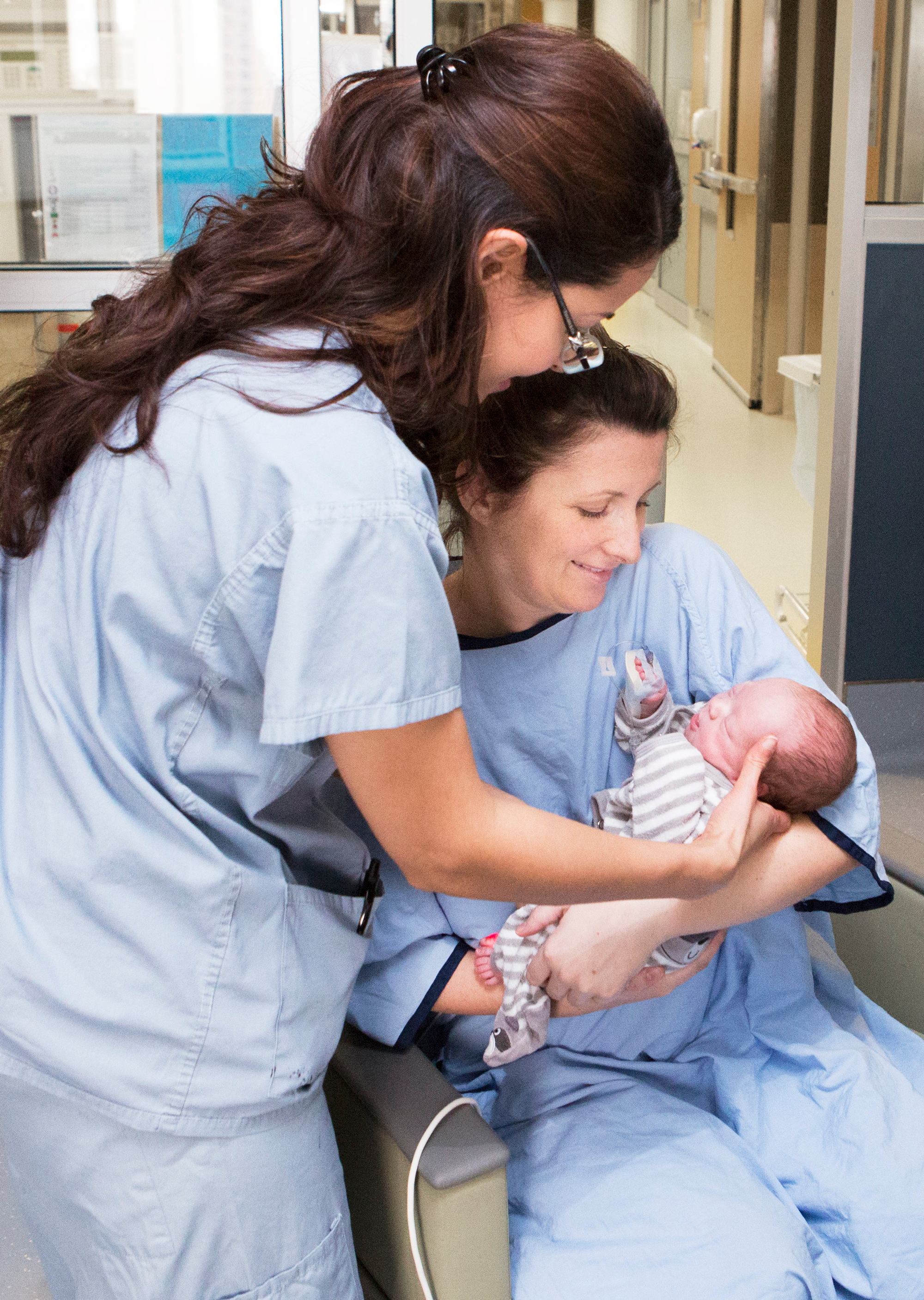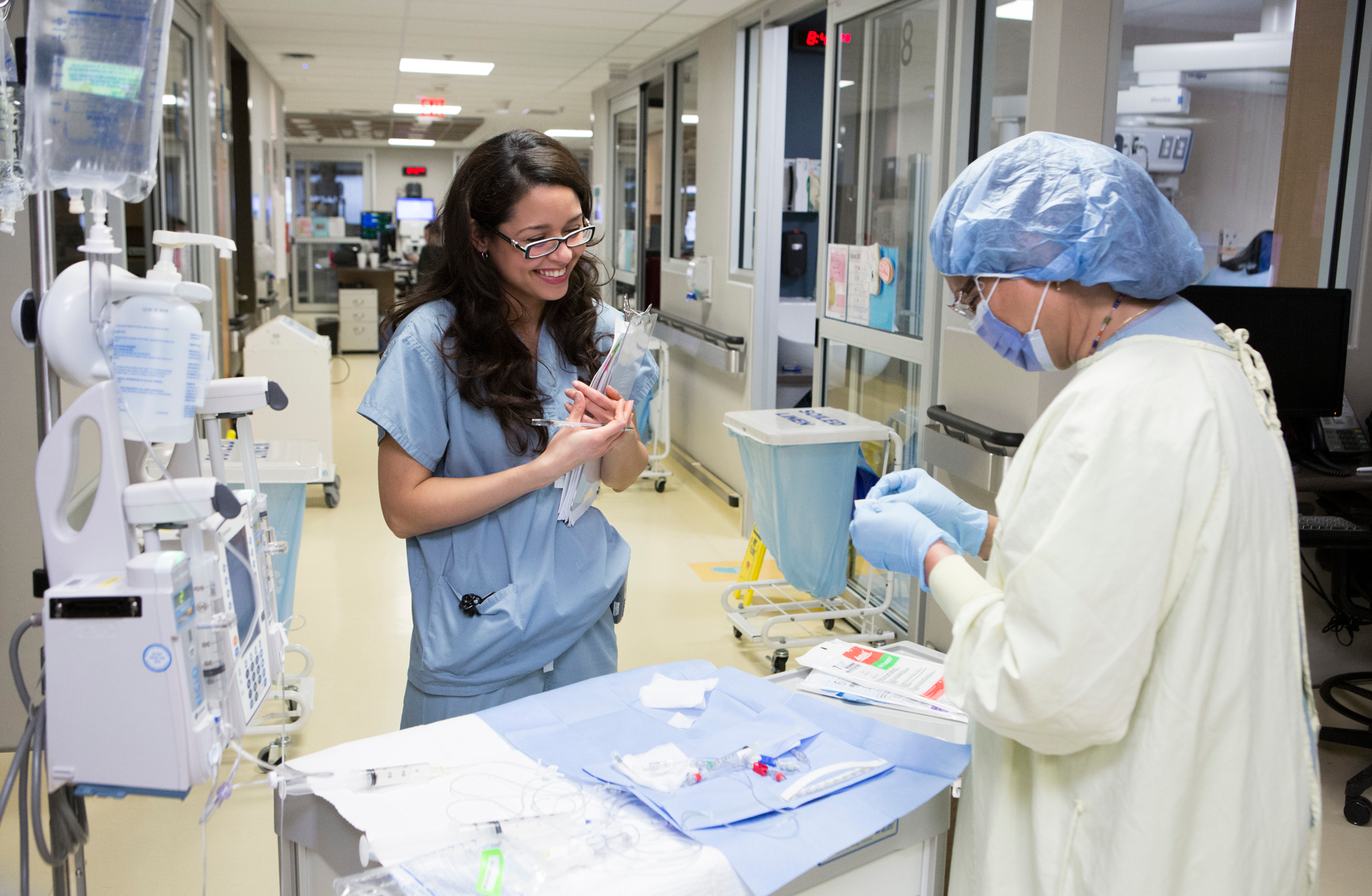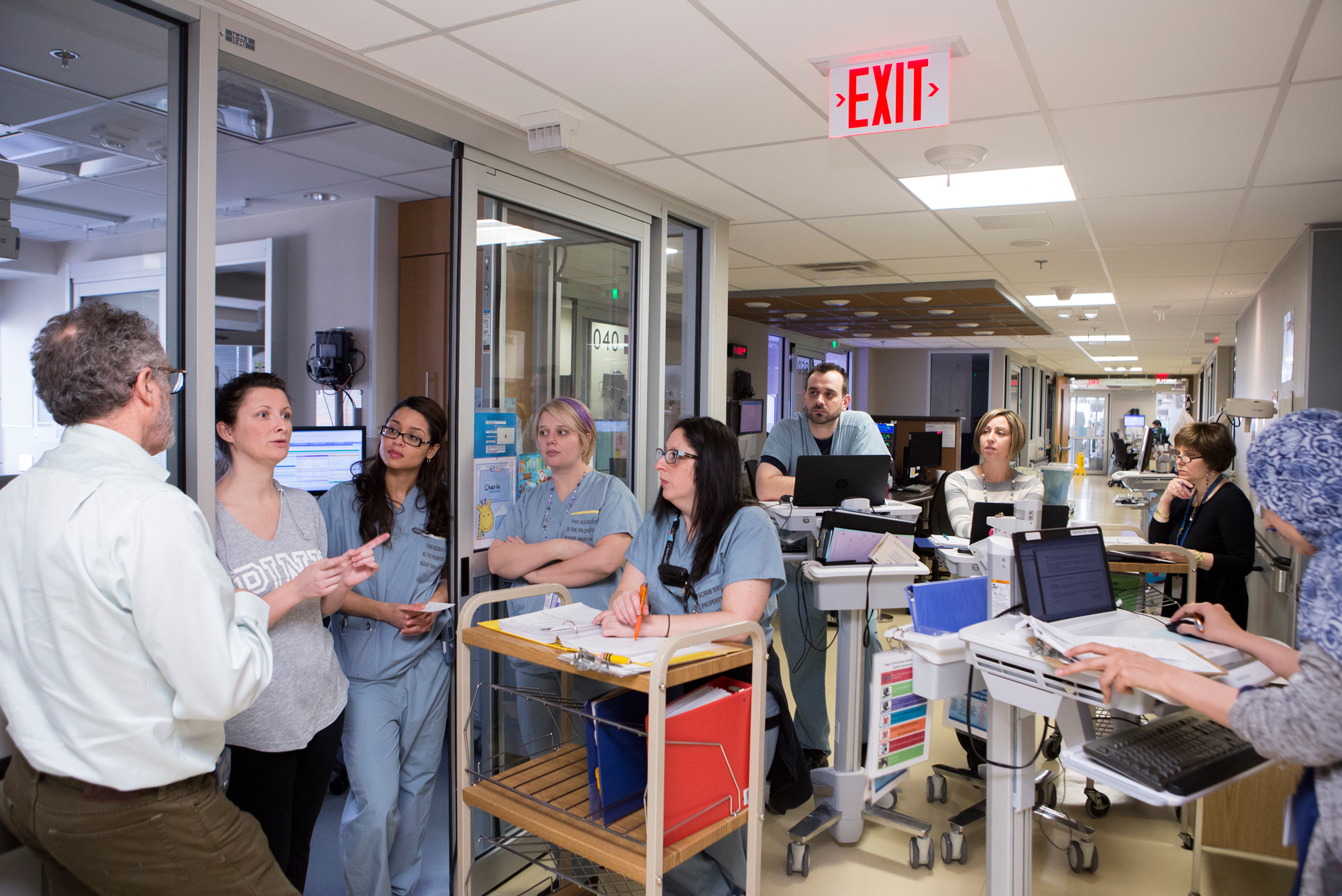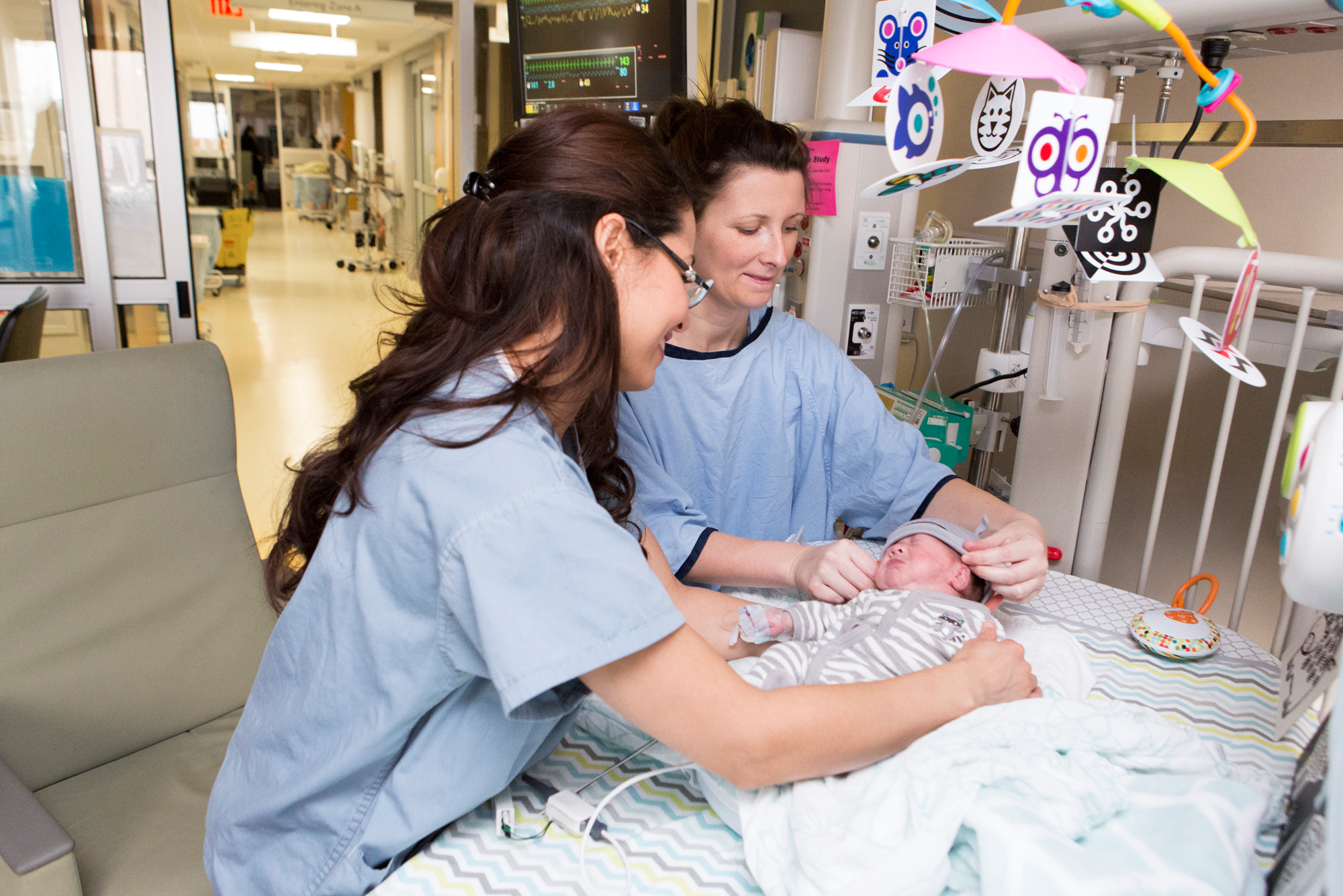

Written By: Janessa Bishop
Photos By: John Packman
It’s 7:45 a.m., and nurse Trisha Young, RN walks around the Newton Glassman Charitable Foundation Neonatal Intensive Care Unit (Glassman NICU) at Mount Sinai Hospital with a smile on her face. She goes from room to room, checking in with the other nurses, asking if they need help. When she spots her colleague Erin Linklater, RN, another NICU nurse, she pulls her into a huge bear hug.
For Trisha, who has worked in the Glassman NICU for more than nine years, the NICU is her second home, and her fellow nurses are like family.
“Choosing nursing as a career was the best professional decision I’ve made,” says Trisha, who adds that she fell in love with the NICU after her first placement at Mount Sinai. “I honestly love what I do. Not a lot of people can actually say they love their jobs, but I love working with the families and the babies, and seeing the impact I can have in their lives.”
Trisha is part of a team of more than 1,500 nurses working around the clock at Sinai Health System. The nurses’ roles vary, from bedside nurses, who interact and provide direct care to patients, to nurse educators, who provide continuing education, training and programs, to advanced practice nurses who lead research and innovation in clinical care, to managers, who ensure each unit is operating efficiently. All of the nurses are trained to assess, treat and manage common and complex responses to illness, and work across all areas of the Hospital, specializing in areas such as cancer, intensive care, geriatrics and emergency medicine. Recently, Mount Sinai became the first hospital in Canada to achieve MagnetŪ status, a prestigious, international credential that measures nursing excellence and patient care.
“MagnetŪ is all about putting the right structures and processes in place to ensure nurses are working at the full scope of their role, and functioning at the highest level of their practice,” says Jane Merkley, Executive Vice-President of Patient Care, Quality and Chief Nurse Executive at Sinai Health System. “The MagnetŪ designation is a validation that our nurses are delivering the best possible care and professional services to our patients. Ultimately, all of this work is about better outcomes for patients, and we can achieve this by ensuring our nurses are performing at the highest level.”
“I think family-centred care will play a key role in the future of nursing at Sinai Health System, and my expectation is nurses will be at the forefront of designing our new care models.”
- Jane Merkley, EVP, Patient Care, Quality and Chief Nurse Executive
The MagnetŪ designation empowers nurses to lead and deliver the very highest standards in patient care and experience. As a result, nurses become pioneers in innovating new models of care and best practices. For example, Trisha recently devised a new, single-person approach to help nurses more efficiently change the central lines that so many NICU babies rely on for fluids, nutrition and medication, while ensuring the sterility of the intravenous tubing. These lines, which require changing every 24 hours, are often in place for several weeks, so sterility is crucial to preventing infection.
“In our old unit, sterile line changes were a two-person procedure, which was convenient when all the babies were in the same room. But in our new single patient rooms, we often had to wait for a nurse to help change the line,” says Trisha. “This new technique maintains sterility of the line and improves outcomes for patients, because we don’t have to wait for another nurse to complete the task.”
 Above: Trisha trains Mercia Pereira, RN to do a sterile single line changes, a technique Trisha developed.
Above: Trisha trains Mercia Pereira, RN to do a sterile single line changes, a technique Trisha developed.
Trisha also developed an education plan — complete with handouts, a video and a mobile training unit — to train other Glassman NICU nurses in the new technique. Earlier this year, she presented the technique at the national Evidence-based Practice for Improving Quality (EPIQ) Conference, ensuring her innovation will have an impact on NICU patients at Mount Sinai and in other hospitals.
Another nursing-driven innovation in the Glassman NICU is family-centred care. NICU nurses teach and support parents to be active partners in their babies’ care, encouraging them to report on their babies’ conditions and help with feedings and diaper changes. The Family Integrated Care Training Module allows parents to be involved with developmental care and bond with their babies sooner, which leads to better outcomes. Mount Sinai was the first hospital in North America to implement such an initiative.
 Above: Melissa reports on her baby, Charlie, during rounds, as part of the Family Integrated Care Training Module. This initiative encourages parents to be involved as much as possible in the care of their babies.
Above: Melissa reports on her baby, Charlie, during rounds, as part of the Family Integrated Care Training Module. This initiative encourages parents to be involved as much as possible in the care of their babies.
“The NICU program is a great example of how nurses are coaching and supporting parents, so they leave the Hospital feeling empowered instead of scared and vulnerable. It moves from an illness model paradigm of nursing to a wellness model,” says Ms. Merkley. “I think family-centred care will play a key role in the future of nursing at Sinai Health System, and my expectation is nurses will be at the forefront of designing our new care models.”
“Nurses play such a vital role at the Hospital,” adds Trisha. “We are there for 12 hours a shift, day and night, and we are the voices of our tiny patients. We truly have a heart for the families as they go through this journey. We’re the ones parents lean on for support, we’re the ones they cry on for comfort, we’re there to celebrate little triumphs and victories. We’re there for their whole journey, and it’s a lifetime of memories for them.”
 Above: Trisha helps Melissa get Charlie ready for a nap. Charlie weighed a mere 900 grams when he was born.
Above: Trisha helps Melissa get Charlie ready for a nap. Charlie weighed a mere 900 grams when he was born.